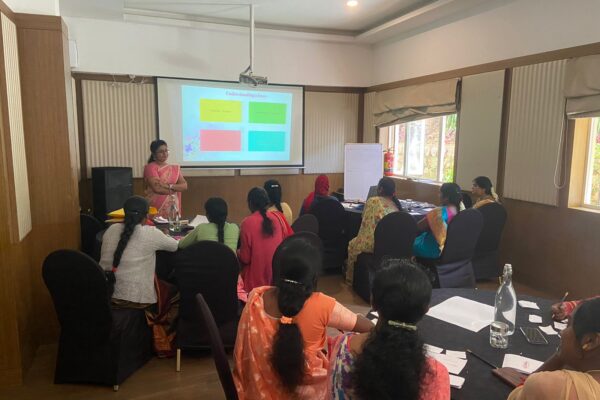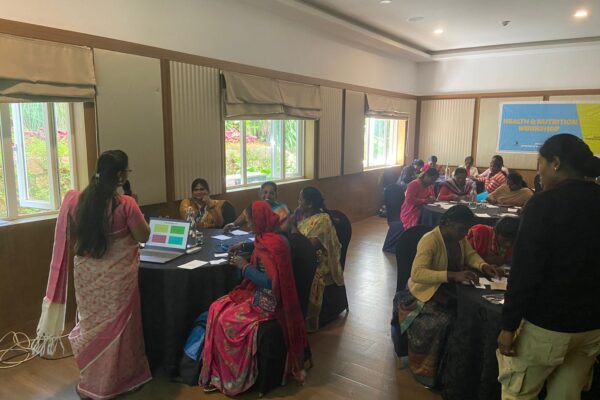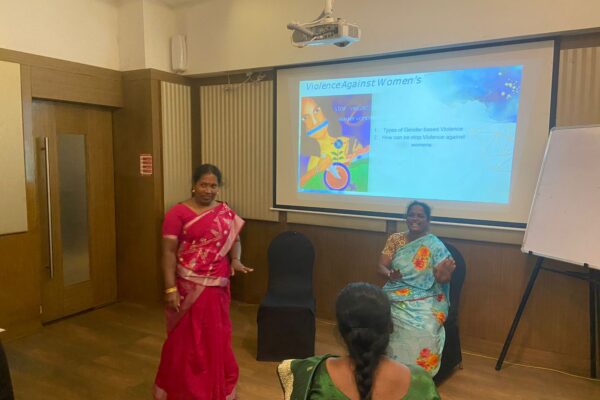Health is a complex matter that is influenced by various interconnected factors, especially the intricate interplay of social and environmental elements. Women’s lived experiences have always been unique and intertwined with health needs. This is often compounded by their roles in “production and reproduction” while positioned at a disadvantage. Hence, their well-being holds significant implications not only for themselves but for their entire families.
Women contribute significantly to the agriculture sector and rural economies as farmers, labourers, and entrepreneurs. Consequently, their health directly impacts the overall family’s health and prosperity. Unfortunately, many women lack awareness about their own health poses a significant obstacle to their well-being. Proper nutrition is fundamental for women to actively participate in society and build healthier generations. In addition, it is of utmost importance to educate women about their health, especially during pregnancy and childbirth.
 Hence, Fairtrade NAPP organized a two-day training program with an aim to raise awareness among women farmers about the importance of women’s health. It sought to strengthen healthcare services, enhance educational initiatives, and address nutritional needs. 18 participants from tea-producing estates engaged in both fieldwork and manufacturing gained valuable insights into health and nutrition.
Hence, Fairtrade NAPP organized a two-day training program with an aim to raise awareness among women farmers about the importance of women’s health. It sought to strengthen healthcare services, enhance educational initiatives, and address nutritional needs. 18 participants from tea-producing estates engaged in both fieldwork and manufacturing gained valuable insights into health and nutrition.
Day 1: Foundation Development.
Day 1 served as a foundation, where participants shared their personal experiences, needs, and expectations. The discussions ranged from dietary habits and daily routines to the intricate web of sociocultural and economic factors impacting women’s health. These conversations shed light on the resilience of these women who endure physical strains while nurturing their families.
The first day commenced with an ice-breaking activity, fostering participant interaction and bonding. The participants were then divided into four groups to express their expectations and needs, which included learning about nutritious foods, hygiene, health issues affecting women, protein-rich foods, community challenges, and understanding Polycystic Ovary Syndrome (PCOD).
The participants’ daily food intake and overall health were then discussed. They were divided into four groups for focus group discussions. The key takeaways from these discussions were as follows-
· The participants’ early morning routines which involved leaving for work on plantations and engaging in extensive household chores without breaks.
· These demanding routines led to various health issues, including headaches and bodily aches. Some participants even disclosed suffering from physical ailments such as knee, back, and joint pain.
· Participants also admitted to not consuming proper foods. This activity shed light the impact multitasking had in their lives as spouses and moms while understanding the need for a balanced diet, particularly a nutritious breakfast, and the need for self-care. These discussions paved the way for further exploration of farmers’ daily lives.
Following this, the discussion centred on farming lifestyles and health. Groups discussed the consequences of skipping breakfast, tending to livestock, working in varying conditions, consuming nutrient-rich foods, and maintaining poor hygiene. Participants acknowledged the significance of healthy soil in crop production.
Subsequently, factors affecting women’s health were explored in groups to explore the sociocultural, environmental, economic, educational, occupational, and healthcare factors. Insights including language barriers, susceptibility to illnesses, prioritizing family over self, illiteracy hindering health awareness, and the impact of occupational stress on physical and mental health had been found to have a profound impact on their lives.
The day concluded by discussing local healthcare facilities specifically focusing on Primary Health Centres (PHCs), Anganwadis, and hospitals. Participants highlighted their access to basic health services and nursing care for pregnant women. The trainer emphasized that health is a fundamental right and encouraged participants to utilize available resources.

Day 2: Addressing critical topics based on the foundation developed.
Day 2 began with a review of Day 1, during which participants shared their thoughts and expectations. The session covered child labour, bonded labour, trafficking, and substance abuse. The trainer divided the participants into 4 groups and requested them to discuss in groups their awareness of these topics. This was an effective discussion as participants gained detailed explanations and distinctions between child labour and forced labour from the trainers as they had limited awareness of these issues. The discussion then shifted to the session on violence against women involved role-playing scenarios that highlighted domestic abuse and its consequences. Participants were divided into Tamil and Hindi groups to act out situations involving harassment by in-laws and spousal abuse. These role plays aimed to increase understanding and awareness of domestic violence issues.
The parenting session explored challenges in parenting, including those faced during adolescence. Women’s rights and responsibilities were discussed, with participants addressing various forms of discrimination and violence against women, such as domestic violence, dowry harassment, sexual harassment, child abuse, verbal abuse, and emotional abuse. The trainer oriented the participants on about women’s rights and laws pertaining to women. Equality, education, equal pay, and the right to vote were also emphasized. At the end of the session, the participants understood that they have an obligation to their community to protect women in their community against all forms of discrimination and violence. The trainer gave more insights into women’s rights which are also, human rights.

This transformative two-day training program organized by Fairtrade NAPP empowered 18 participants from tea-producing estates, equipping them with a profound understanding of women’s health and its broader impact on families and communities. As a result, participants not only expressed gratitude to the organizers and trainers for the invaluable opportunity to enhance their knowledge and awareness but also made a resolute commitment to share their newfound insights with their superiors. They passionately advocated for the continuation of such sessions in the future to deepen their understanding and broaden their impact. This program has ignited a collective sense of purpose among the participants. They now recognize that women’s health is a shared responsibility, transcending individual concerns. Armed with knowledge and renewed determination, they return to their communities as champions of women’s rights and well-being, poised to effect positive change and contribute to the empowerment of women and the betterment of society as a whole.
Testimonials:
“The 2-day session was very useful. We understood all topics easily. Discussion on farmer’s day-to-day life was very good. Very interactive session. The conversation on women was very useful. Really very thankful to Fairtrade for organizing such a wonderful session and to the resource person.” – Esther, Matheson Bosanquet Enterprises Ltd.
“Thank you, Fairtrade NAPP, for organizing this training program. We have gained more knowledge on the topic of health and Hygiene. These 2 days were very useful and informative.” – Jayalakshmi, Matheson Bosanquet enterprises Ltd.







